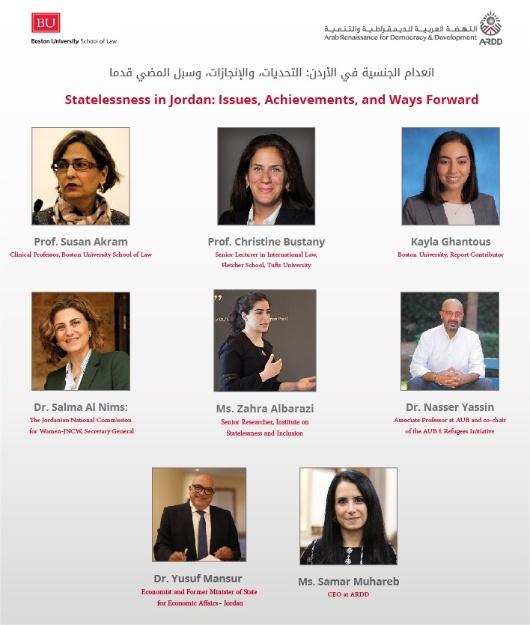In partnership with Boston University School of Law International Human Rights Clinic (IHRC), the Arab Renaissance for Democracy and Development (ARDD) on Monday, March 1, 2021, held the online workshop “Statelessness in Jordan: Issues, Achievements, and Ways Forward”; taking part were stakeholders from non-governmental organizations, academic institutions and other concerned entities. At the workshop, a comprehensively researched report on statelessness and vulnerable refugee populations in Jordan, and the pertinent international, regional and domestic laws and policies was launched.
IHRC partnered with ARDD’s Al-Nahda Thought Center for Research to produce this report as part of a multi-year project to address the situation of displaced or stateless persons, or individuals at risk of becoming stateless, in the MENA region.
Boston University School of Law Clinical Professor Susan M. Akram, Fletcher School of Law & Diplomacy senior lecturer in international law Christine B. Bustany and Kayla Ghantous research contributor from Boston University shed light on the report’s key findings on the conditions of stateless persons, refugees and individuals at risk of statelessness in Jordan, as well as on the international, regional and local laws and policies pertaining to the issue.
This was followed by a panel discussion by experts on statelessness in Jordan. The discussion was moderated by former Minister of State Economic Affairs Dr.Yusuf Mansur; Dr. Salma Nims, secretary-general of the Jordan National Council for Women, and Dr. Nasser Yassin, associate professor at AUB and co-chair of the AUB4Refugee initiative, reviewed current issues and aspects of development in the context of the presence of stateless and refugees individuals.
Dr. Yassin and Dr. Zahra Al Barazi, senior research officer at the London-based Institute on Statelessness and Inclusion, presented the ongoing works and ideas on the way forward for advocacy efforts in this regard in the Middle East and North Africa.
Participants called for more effort to be exerted to facilitate the implementation of legislative and policy changes, to make them be in line with its international and regional legal obligations. The most critical reforms needed include ensuring children’s right to nationality, gender-equality nationality laws, and legal status for refugees and migrant populations.


